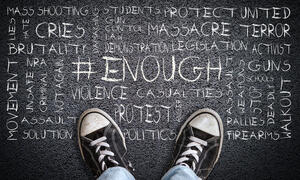1,244 Results
Why Civics Education Needs Social Justice
From an early age, each of us must navigate numerous social institutions, many of which were designed to perpetuate centuries-old inequities. For us to move in those spaces with power and agency, civic knowledge, skills and dispositions are essential. But alarming trends reveal a sharp decline in civics competency among adults in the United States, and participation in places that bring people together to solve common problems has withered, too. Civics education needs a critical social justice lens so people can fulfill the potential of a multiracial and inclusive democracy.
- Why Civics Needs Social Justice Education
- What Is Social Justice Education?
- Social Justice Standards
Dismantling the School-to-Prison Pipeline
School policies that include harsh punishments, automatic out-of-class time and police involvement for discipline contribute to pushing young people out of classrooms and into the criminal legal system. These punitive practices disproportionately affect Black and other children of color, students with disabilities, young people experiencing poverty and children from communities that have been historically marginalized. Urgent change is needed to end school pushout and dismantle this school-to-prison pipeline.
- What Is the School-to-Prison Pipeline, and How Do We Dismantle It?
- Only Young Once: Dismantling Georgia’s Punitive Youth Incarceration System
- The Heart of Facilitation in Restorative Justice
Protect LGBTQ+ Progress Toward Equality

On Intersectionality and Allyship

Don’t Stop Talking About Gun Violence

What Is the School-to-Prison Pipeline, and How Do We Dismantle It?
A Message From Our Director
Reflecting on Personal Stories

The Power of Place
